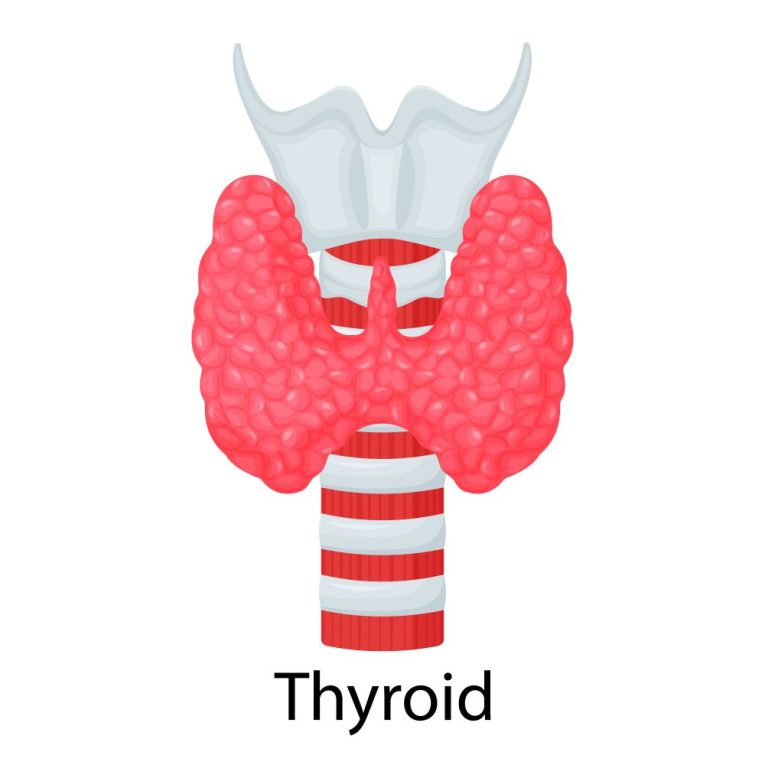Thyroid health is a crucial aspect of overall well-being. When the thyroid gland doesn’t produce enough hormones, it leads to a condition called hypothyroidism. This disorder can affect energy levels, metabolism, mental health, and even fertility. But the good news? With the right knowledge, early detection, and lifestyle adjustments, hypothyroidism prevention is possible.
In this comprehensive guide, we’ll explore what is hypothyroidism, its signs, causes, available treatments, and how to prevent thyroid problems naturally and effectively.
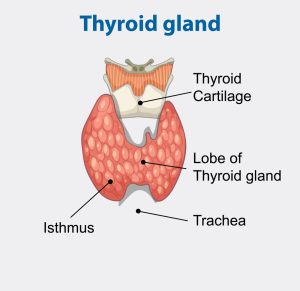
What Is Hypothyroidism?
Hypothyroidism represents an underactive state of the thyroid gland situated at the base of the neck. It is responsible for the secretion of thyroid hormones, which play a fundamental role in maintaining an organisms metabolism, temperature, pulse, and other bodily processes.
When hormone levels drop, the body’s processes slow down, leading to a variety of health issues. It’s more common in women, especially those above 40, but it can affect people of any age.
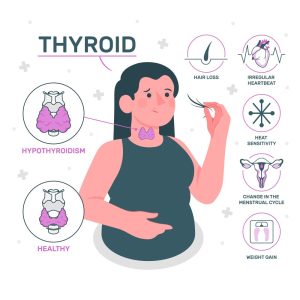
Hypothyroidism Symptoms
The signs of hypothyroidism can be subtle at first and may develop slowly over time. Some people may attribute the symptoms to aging or stress. However, identifying them early is key to better management. Here are the most common hypothyroidism symptoms:
- Persistent fatigue or low energy
- Weight gain despite no changes in diet or activity
- Dry skin and brittle nails
- Constipation
- Depression or mood swings
- Slow heart rate
- Sensitivity to cold
- Puffy face or swelling
- Hoarseness
- Memory issues or difficulty concentrating (brain fog)
- Irregular or heavy menstrual periods
- Hair thinning or hair loss
- Joint pain
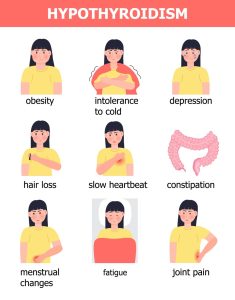
Hypothyroidism Causes: Why Does It Happen?
Understanding the causes of hypothyroidism can help in early diagnosis and even prevention. Here are some of the most common reasons:
1. Autoimmune Disease (Hashimoto’s Thyroiditis)
This is the leading cause of hypothyroidism. In Hashimoto’s disease, the immune system mistakenly attacks the thyroid gland, impairing its function.
2. Thyroid Surgery or Radiation Therapy
Surgical removal of the thyroid or radiation therapy for head and neck cancers can cause damage to the gland and lead to hypothyroidism.
3. Iodine Deficiency
Iodine is vital for thyroid hormone production. Inadequate intake can cause the gland to become underactive.
4. Certain Medications
Drugs like lithium or amiodarone can interfere with thyroid hormone production.
5. Congenital Hypothyroidism
Some babies are born with a dysfunctional or absent thyroid gland.
6. Pituitary Gland Disorders
If the pituitary fails to signal the thyroid correctly, hormone production can fall.
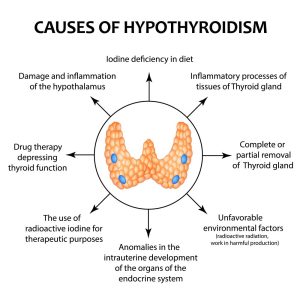
How Is Hypothyroidism Diagnosed?
Diagnosing hypothyroidism involves a combination of symptom review, physical examination, and laboratory tests. Since the symptoms can be mild and develop gradually, many individuals may not realize they have a thyroid issue until routine blood work reveals it.
1. Clinical Evaluation
- Review your medical history, including family history of thyroid problems.
- Ask about symptoms such as fatigue, weight gain, cold intolerance, dry skin, and constipation.
- Perform a physical examination to check for signs like a slow heart rate, dry skin, puffy face, or an enlarged thyroid gland (goiter).
2. Blood Tests
Blood tests are the most accurate way to confirm hypothyroidism. The following hormone levels are assessed:
TSH (Thyroid-Stimulating Hormone) Test
- This is the primary screening test.
- A high TSH level indicates the pituitary gland is working harder to stimulate an underactive thyroid, which suggests hypothyroidism.
Free T4 (Thyroxine) Test
- This measures the level of unbound, active thyroxine hormone in the blood.
- A low free T4 level, along with high TSH, confirms primary hypothyroidism.
T3 Test
- Though not commonly used in initial diagnosis, it may be tested in certain cases.
- T3 levels may still be normal in early or mild hypothyroidism.
3. Thyroid Antibody Tests
If autoimmune thyroid disease (like Hashimoto’s thyroiditis) is suspected, the doctor may order:
- Anti-thyroid peroxidase (TPO) antibodies
- Anti-thyroglobulin antibodies
The presence of more antibodies indicates the immune system is attacking the thyroid gland, a common cause of hypothyroidism.
4. Imaging Tests (in Select Cases)
In some situations—especially when a goiter or thyroid nodule is present—doctors may recommend:
- Thyroid ultrasound to examine any thyroid gland abnormalities.
- Radioactive iodine uptake test to understand how well the thyroid absorbs iodine, though this is more often used for hyperthyroidism diagnosis.
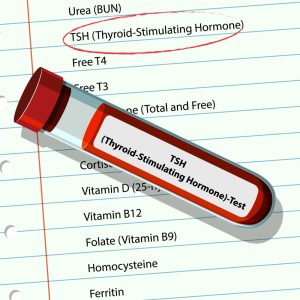
When to Get Tested?
It’s advisable to test your thyroid function if you:
- Experience multiple symptoms of hypothyroidism.
- Have a family history of thyroid disease.
- Are pregnant or planning pregnancy.
- Have autoimmune conditions like type 1 diabetes or rheumatoid arthritis.
- Are over 60, especially women.
Medicine for Hypothyroidism
The most effective medicine for hypothyroidism is synthetic thyroid hormone—levothyroxine. It’s an oral medication that restores normal hormone levels and alleviates symptoms.
Here are a few things to keep in mind:
- It’s usually a lifelong therapy.
- The dosage may need adjustments depending on age, weight, pregnancy, and other health conditions.
- It’s best taken on an empty stomach in the morning, 30-60 minutes before eating.
Consistency is key. Regular blood tests (TSH levels) help ensure that the dosage remains effective over time.
How to Prevent Thyroid Problems?
While not all causes of hypothyroidism are preventable—especially genetic or autoimmune ones—you can take steps to reduce your risk. Here’s how to prevent thyroid dysfunction naturally:
1. Ensure Adequate Iodine Intake
Thyroid function requires iodine. In India, the use of iodized salt serves this purpose. Increase your intake of iodine-containing products such as fish, dairy products, and seaweed.
2. Reduce Exposure to Pollution
Certain industrial contaminants, as well as BPA found in plastics, pesticides, and a range of other chemicals, can disturb the functionality of the thyroid. Use glass containers and eat organic when possible.
3. Manage Stress Levels
Chronic stress disrupts hormone balance and can indirectly affect the thyroid. Perform stress-reduction methods such as yoga, meditation, or breathing exercises.
4. Avoid Excessive Soy & Cruciferous Vegetables (Raw)
While healthy in moderation, large quantities of raw soy, cabbage, or broccoli may interfere with iodine uptake in people with iodine deficiency.
5. Regular Exercise
Physical activity boosts metabolism and supports hormonal balance.
6. Screen Your Thyroid Regularly
If you have a family history of thyroid problems or other risk factors, get tested once a year.

Hypothyroidism Prevention: Smart Lifestyle Choices
Here are a few daily habits that promote thyroid health and aid in hypothyroidism prevention:
- Eat a balanced diet with enough selenium (found in nuts, fish, and eggs)
- Avoid smoking—it damages thyroid tissue
- Stay hydrated to support all cellular functions
- Get 7-8 hours of restful sleep per night
- Avoid crash dieting or prolonged fasting, which can slow metabolism

Frequently Asked Questions
1. Can hypothyroidism go away without treatment?
No. It usually requires lifelong management with medication.
2. Is there a natural cure for hypothyroidism?
While some lifestyle changes help manage it, there’s no natural replacement for hormone therapy if diagnosed.
3. Who is at risk of developing hypothyroidism?
Women over 40, those with a family history, and individuals with autoimmune conditions are at higher risk.
4. What are the first signs I should notice?
Tiredness, weight gain, feeling cold often, and dry skin are usually early warning signs.
Conclusion:
It is possible to effectively manage hypothyroidism as long as it is detected early, and the individual adheres to the right medications and makes conscious lifestyle adjustments, even though it may persist throughout one’s life. The diagnosis of hypothyroidism requires knowledge about its causes, symptoms, and how to avert problems associated with the thyroid.
If you or someone you know is experiencing symptoms, don’t ignore them. Talk to a doctor, get tested, and start early treatment. Because when it comes to thyroid health—prevention, awareness, and consistency make all the difference.

